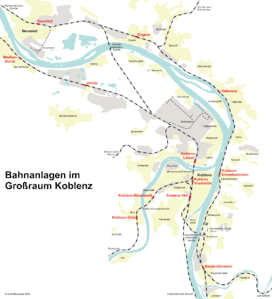Koblenz-Ehrenbreitstein station
Koblenz-Ehrenbreitstein station is the only station on the right (eastern) bank in the city of Koblenz in the German state of Rhineland-Palatinate. It is on the East Rhine railway (German: Rechte Rheinstrecke, Right Rhine line) at the foot of Ehrenbreitstein hill in Ehrenbreitstein district, next to the Rhine.
| Through station | |||||||||||
 Koblenz-Ehrenbreitstein station beside the Rhine | |||||||||||
| Location | Hofstr.257, Koblenz, Rhineland-Palatinate Germany | ||||||||||
| Coordinates | 50°21′43″N 7°36′37″E | ||||||||||
| Line(s) | East Rhine Railway(KBS 465) | ||||||||||
| Platforms | 3 [1] | ||||||||||
| Other information | |||||||||||
| Station code | 3300[1] | ||||||||||
| DS100 code | KKOE[2] | ||||||||||
| IBNR | 8003351 | ||||||||||
| Category | 5[1] | ||||||||||
| Website | www.bahnhof.de | ||||||||||
| History | |||||||||||
| Opened | 1869 | ||||||||||
| Services | |||||||||||
| |||||||||||
History

In 1859 and 1860 the governments of Prussia and Nassau negotiated over the construction of a railway between Ehrenbreitstein and Oberlahnstein. In Oberlahnstein the line would connect with the Nassau Rhine Railway (now part of the East Rhine line), then under construction, and the Lahn Valley Railway. It was also stipulated in the contract that a railway bridge would be built between Koblenz and Ehrenbreitstein and the Duchy of Nassau committed itself to promote the construction of the Lahn Valley Railway.[3]
The Neuwied–Niederlahnstein section, including Ehrenbreitstein station, was put into operation on 27 October 1869. It had a railway post office and accommodation for the “track supervisor” (Bahnmeister).[4] On the same day, the line was opened from Ehrenbreitstein station via Pfaffendorf Bridge to the former Rhenish railway station at Koblenz. The Rhenish station was north-west of today's Löhr-Center in Fischelstraße.[5] The track remained under control of the railway company (which had become one of the Prussian state railways in 1880) only until 1899. The track over the bridge was then rebuilt for use by the Coblenz Tramway Company (Coblenzer Straßenbahn-Gesellschaft). In 1879, the Horchheim Railway Bridge was opened south of Pfaffendorf Bridge, connecting to the East Rhine railway and to Koblenz Hauptbahnhof (central station), when it opened in 1902.
Services


The station is served by the Rhein-Erft-Bahn, running on the Koblenz–Cologne–Mönchengladbach route at hourly intervals, former by the Rhein-Erft-Express. Previously, the Rhein-Erft-Express had continued to Venlo after Mönchengladbach since its introduction in 1998.[6]
| Line | Service | Route | Frequency |
|---|---|---|---|
| RB 27 | Rhein-Erft-Bahn | Mönchengladbach – Rheydt – Cologne – Köln/Bonn Flughafen – Troisdorf – Bonn-Beuel – Linz (Rhein) – Neuwied – Koblenz-Ehrenbreitstein – Koblenz | Hourly |
Until after the Second World War Ehrenbreitstein station also had significant long-distance traffic, since some of the trains on the right bank line did not serve Koblenz Hauptbahnhof. In the final timetable before the war all semi-fast trains and a D-train (D-Zug, express train with carriages with corridors) stopped at Ehrenbreitstein station.[7]
Notes
- "Stationspreisliste 2021" [Station price list 2021] (PDF) (in German). DB Station&Service. 16 November 2020. Retrieved 3 December 2020.
- Eisenbahnatlas Deutschland (German railway atlas) (2009/2010 ed.). Schweers + Wall. 2009. ISBN 978-3-89494-139-0.
- G. Decker (1860). Gesetz-Sammlung für die königlichen preussischen Staaten (in German). Prussia. p. 282. Retrieved 14 August 2011.
- "Private site on Ehrenbreitstein station" (PDF) (in German). Retrieved 14 August 2011.
- "100 Jahre Koblenz Hbf" (in German). uqp.de. Retrieved 14 August 2011.
- "Rhein-Erft-Express". NRW rail archive (in German). André Joost. Retrieved 14 August 2011.
- "Extract from the German rail timetable 1939, table 230: Frankfurt – Wiesbaden – Niederlahnstein – Köln" (in German). deutsches-kursbuch.de. Retrieved 14 August 2011.
References
- Energieversorgung Mittelrhein GmbH (ed.). Geschichte der Stadt Koblenz (in German). Overall editor: Ingrid Bátori with Dieter Kerber and Hans Josef Schmidt.
External links
- "Track plan" (PDF) (in German). DB Netz. Retrieved 23 June 2017.
- "Photographs of the loading of tanks in Koblenz-Ehrenbreitstein station" (in German). Retrieved 14 August 2011.
| Wikimedia Commons has media related to Koblenz-Ehrenbreitstein station. |